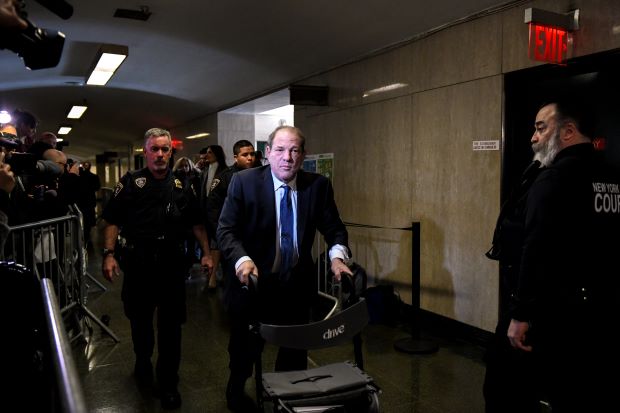Harvey Weinstein’s conviction is overturned by New York’s top court

By Jonah E. Bromwich and Maria Cramer
NEW YORK – New York’s highest court on Thursday (25) overturned Harvey Weinstein’s 2020 conviction on felony sex crime charges, a stunning reversal in the foundational case of the #MeToo era.
In a 4-3 decision, the New York Court of Appeals found that the trial judge who presided over Weinstein’s case, Justice James M. Burke, had made a crucial mistake, allowing prosecutors to call as witnesses a series of women who said Weinstein had assaulted them — but whose accusations were not part of the charges against him.
Citing that decision and others it identified as errors, the appeals court determined that Weinstein, who as a movie producer had been one of the most powerful men in Hollywood, had not received a fair trial.
The ruling does not mean Weinstein, who is being held in an upstate New York prison, is a free man. He was sentenced in 2022 to 16 years in prison in California after he was convicted of raping a woman in a Beverly Hills hotel, and will now be sent to California to continue his sentence on the convictions there, according to his spokesperson.
When reached by phone, Arthur Aidala, Weinstein’s lawyer, praised the appeals court “for upholding the most basic principles that a criminal defendant should have in a trial.”
In a statement, a spokesperson for the Manhattan district attorney’s office said, “We will do everything in our power to retry this case and remain steadfast in our commitment to survivors of sexual assault.”
Weinstein was accused of sexual misconduct by more than 100 women; in New York, he was convicted in 2020 of assaulting two of them. Thursday’s appeals decision underscores the legal system’s difficulty in delivering redress to those who say they have been the victims of sex crimes.
Thursday’s decision was disheartening news for Weinstein’s accusers and supporters of the #MeToo movement. Jane Manning, the director of the Women’s Equal Justice project, called it “a shocking and disheartening day for survivors of sexual assault,” and said it “shows how much more work we all have to do to bring the ideals of the #MeToo movement forward”.
Reports of Weinstein having sexually abused women appeared in The New York Times in the fall of 2017. Their stories ignited what would become known as the #MeToo movement, a global repudiation of sexual misconduct by powerful men.
In 2018, Weinstein was indicted by a Manhattan grand jury. At trial, which began in January 2020, he faced two counts of predatory sexual assault, one count of third-degree rape and one count of first-degree criminal sexual assault.
The charges rested mainly on the allegations of two women: Miriam Haley, who said Weinstein forcibly performed oral sex on her in 2006, and Jessica Mann, who said he raped her in 2013.
The prosecution was successful: In February 2020, a jury convicted Weinstein of criminal sexual assault in the first degree and rape in the third degree. He was acquitted of the two counts of predatory sexual assault. Weinstein was sentenced to 23 years in prison.
During the trial, the judge had allowed four other women to testify that Weinstein had assaulted them. In successive appeals, his lawyers have argued those witnesses should never have been allowed to testify.
-New York Times


Comments are closed, but trackbacks and pingbacks are open.